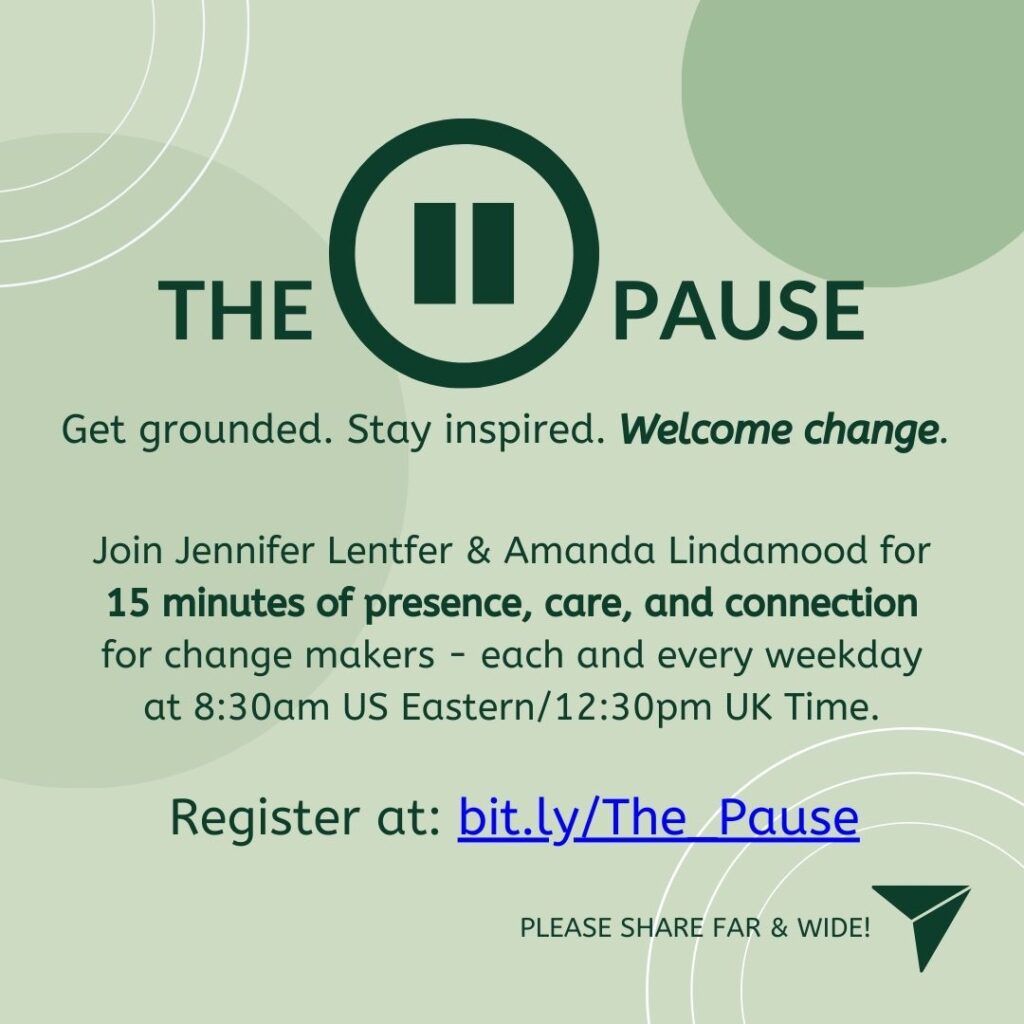- Aug 8, 2025
Let us be guardians
- Jennifer Lentfer
- 0 comments
The more I support organizational leaders, the more I notice how little time or energy there is for “thinking in possibility.” Any “what if…?” moments have to be carved out of our schedules and defended with leaders’ own steely will and devotion to protecting their space for self-reflection.
From ongoing genocides to economic and financial uncertainty to the never-ceasing google document comment notifications, late-stage settler capitalism is constantly distracting and exhausting for us. So I have this very pragmatic question for our sector:
How do we make sufficient space for other possibilities to emerge?
When authoritarian regimes are bearing down on civil society and government institutions, when fundraising and donor engagement seems to crowd out energy for programs, when the challenges far outweigh our ability to respond…what other choices can we perceive?
I recently made a boiled-down list of the five (yes, only five!) things that people in the international aid and philanthropy sector (and frankly, many other types of professionals) do all day, our essential actions if you will:
1) Make a strategy or a plan
2) Have a meeting or an event
3) Offer a tool and/or training
4) Create or monitor a budget
5) Write a report
Meanwhile, we are trying to get around the boss with toxic behavior who is constantly throwing up obstacles. We wrestling with our discomfort when sitting in a meeting and untruths are being shared. As we navigate our nervous systems’ reactions in unhealthy systems, our shut-downs can limit the possibilities for something different to emerge, or perhaps more accurately, can severely limit our ability to even see any other possibilities at all.
Yes, it’s easier to rely on procedures rather than your own discernment. Of course it’s easier to perceive our own powerlessness and blame the established bureaucratic procedures or each other, rather than take responsibility for the problems created by them. We then all continue to pay the price in terms of loss of motivation, creativity, morality and our own human potential.
So what options do we have – right now? Even if they are small steps that are available right now or in the near future, not just somewhere in a far-off, imagined world to come. In the social good sector, within and outside of those five things professionals do all day, can we redefine what our role is in these times? How do we bring forth that new world now?
What if we saw ourselves as the guardians of the possible?
What if the problems we’ve been trying to address with technical fixes are too big and too overwhelming and too interconnected to pretend that anything else is workable?
What if we pay attention to very different dynamics in our work? What if we notice and narrate how power is being used and consolidated – first by ourselves, then in our teams and organizations, then in the world?
What if we didn’t have to know what to do next, but we understood our jobs as a duty to experiment, to release our dependencies (perceived or real), and to protect the space for something else – something unexpected or unknowable – to happen next?
In my limited role and measly contribution to this vast ecosystem of change, here’s what I want to protect the space for:
more shared responsibility and collective discernment
longer timelines and timescales
untangling of internalized oppressive narratives
provocative questions and important, emerging insights
affirmation of people’s capacity to act creatively
recognizing and unleashing the transformative power of everyday people (people not in the sector)
a state of constant reparation, repair, evolution and re-emergence
the merged expression of our values and our daily practices, with more specificity and less blind adherence to high-minded concepts and shallow ideals
learning out loud in groups (inside and outside of our workplaces)
in the words of one of my mentors, Sayra Pinto, “a deep disconfirmation of the way white people [and men] use their power”
structures that honor difference and ensure belonging and non-extraction
responses to what’s unfolding that are rooted in love
invitations to be open and surprised
reconciling the desire for certainty and the space for possibility
the possibility of wellbeing for all Life, where all of us humans and non-humans can thrive.
It’s time. It has been time to do something different than what we’ve done before to open up the possibility for a different outcome. Thinking in possibilities is not for everyone, but we do need every person staying awake and asking questions. We do need every human possible to resist anything that preferences the status quo that amasses more for those who already have too much.
My fellow guardians, be resolved: what is true now, does not have to be.
Maybe when the stinging, throbbing, ever-aching reality of people’s suffering in the world weighs heavy on our hearts, or maybe when our own circumstances constrict our sense of possibility, can we build our capacity and instinct to be protectors of the possible? To continue to commit to the tiniest pieces of the world we know is possible, and bring them into being in this present moment?
Can we simply allow ourselves to pause?
Past recordings of "The Pause" can be found here.

